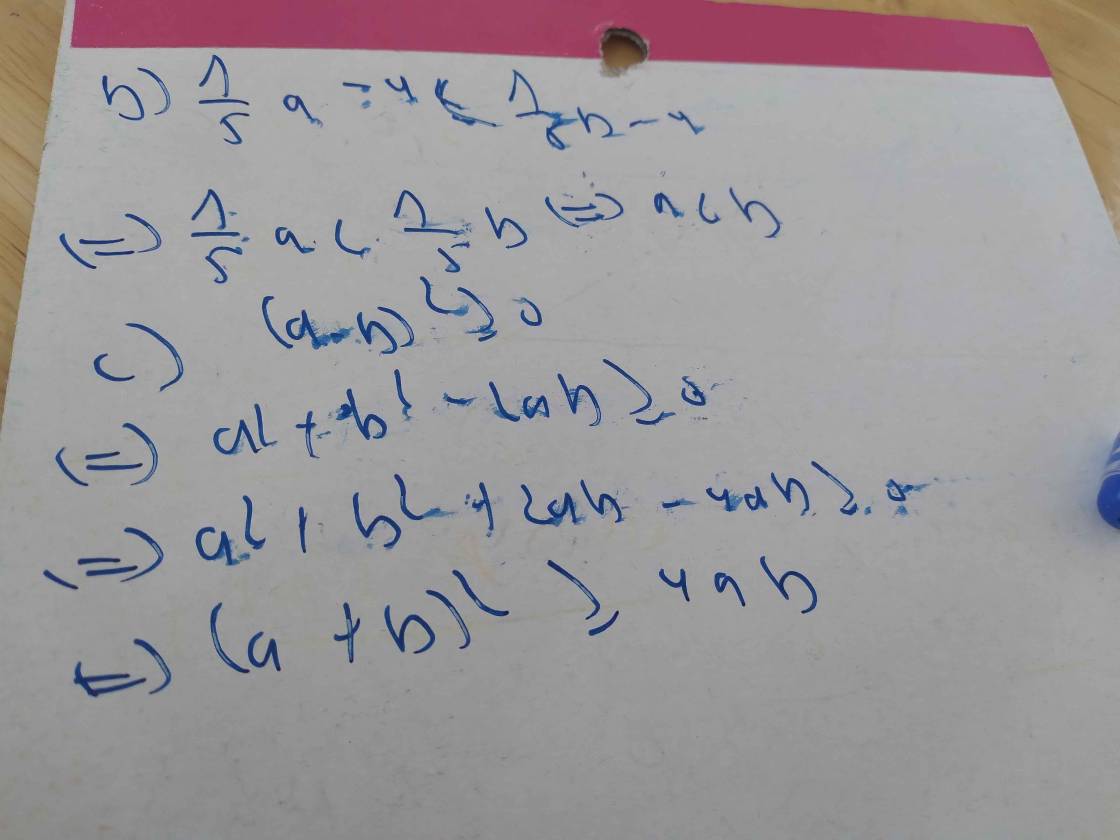4x+2x(x+1)=(2x-1)^2
Ôn tập: Bất phương trình bậc nhất một ẩn
\(4x+2x\left(x+1\right)=\left(2x-1\right)^2\)
\(=4x+2x^2+2x=4x^2-4x+1\)
\(=6x+2x^2=4x^2-4x+1\)
\(=2x^2-4x^2+6x+4x=1\)
\(=-2x^2+10x-1=0\)
\(\Delta=10^2-4\cdot\left(-2\right)\cdot\left(-1\right)=92\)
\(\Leftrightarrow\left\{{}\begin{matrix}x_1=\dfrac{-10+\sqrt{92}}{2\cdot\left(-2\right)}=\dfrac{5-\sqrt{23}}{2}\\x_2=\dfrac{-10-\sqrt{92}}{2\cdot\left(-2\right)}=\dfrac{5+\sqrt{23}}{2}\end{matrix}\right.\)
Vậy ....
Đúng 4
Bình luận (1)
=>4x^2-4x+1=4x+2x^2+2x=2x^2+6x
=>2x^2-10x+1=0
Δ=(-10)^2-4*2*1=100-8=92>0
=>Phương trình có hai nghiệm pb là:
\(\left\{{}\begin{matrix}x_1=\dfrac{10-2\sqrt{23}}{4}=\dfrac{5-\sqrt{23}}{2}\\x_2=\dfrac{5+\sqrt{23}}{2}\end{matrix}\right.\)
Đúng 3
Bình luận (0)
Xem thêm câu trả lời
Cho x1,y1�1,�1 và x+y6�+�6 Tìm giá trị nhỏ nhất của biểu thức: P5(2x+y)+4(8x−1+3y−1)Giải chi tiết giúp tôi nha
Đọc tiếp
Cho và Tìm giá trị nhỏ nhất của biểu thức: ải chi tiết giúp tôi nha
Cho tích a.b.c =1 và a+b+c>1/a+1/b+1/c
CM;(a-1).(b-1).(c-1)>0
cảm ơn bạn nào đã giúp mình đây là bài kha dễ nên để các bạn làm
Ta có:
\(\dfrac{1}{a}\) + \(\dfrac{1}{b}\) + \(\dfrac{1}{c}\) = \(\dfrac{bc+ac+ab}{abc}\)= bc + ac + ab (Vì abc = 1)
⇔ a + b + c > bc + ac + ab
⇔ a + b + c - bc - ac - ab > 0
⇔ a + b + c - bc - ac - ab + abc - 1 > 0
⇔ (a - ab) + (b - 1) + (c - bc) + (abc - ac) > 0
⇔ -a(b - 1) + (b - 1) + -c(b - 1) + ac(b - 1) > 0
⇔ (b - 1)(-a + 1 - c +ac) > 0
⇔ (b - 1)[(-a +1) + (ac - c)] > 0
⇔ (b - 1)[-(a - 1) + c(a - 1)] > 0
⇔ (b - 1)(a - 1)(c-1) > 0
Đúng 2
Bình luận (0)
Giải các bất phương trình sau và biểu diễn trục số :
a)\(\left(2x-3\right)\left(x+4\right)>2\left(x^2+1\right)\)
b)\(\dfrac{3x-1}{x-2}-\dfrac{5x+1}{3}>4\)
a: =>2x^2+8x-3x-12<2x^2+2
=>5x<14
=>x<14/5
b: =>\(\dfrac{9x-3-\left(5x+1\right)\left(x-2\right)}{3\left(x-2\right)}-4>0\)
=>\(\dfrac{9x-3-5x^2+10x-x+2-12\left(x-2\right)}{3\left(x-2\right)}>0\)
=>\(\dfrac{-5x^2+18x-1-12x+24}{3\left(x-2\right)}>0\)
=>\(\dfrac{-5x^2+6x+23}{x-2}>0\)
TH1: x-2>0 và -5x^2+6x+23>0
=>x>2 và \(\dfrac{3-2\sqrt{31}}{5}< x< \dfrac{3+2\sqrt{31}}{5}\)
=>\(2< x< \dfrac{3+2\sqrt{31}}{5}\)
TH2: x-2<0 và -5x^2+6x+23<0
=>x<2 và \(\left[{}\begin{matrix}x< \dfrac{3-2\sqrt{31}}{5}\\x>\dfrac{3+2\sqrt{31}}{5}\end{matrix}\right.\)
=>\(x< \dfrac{3-2\sqrt{31}}{5}\)
Đúng 1
Bình luận (0)
a) Tìm các số tự nhiên x thỏa miền bắt phương trình sau b) Cho 1/5 * a - 4 < 1/5 * b - 4 Hãy so sánh a và bị b. c) Chứng minh: (a + b) ^ 2 >= 4ab - 2 < 2x + 8
Giải bất phương trình sau(x-1)(x+2)>(x-1)²+3
`(x-1)(x+2)>(x-1)^2+3`
`<=> x^2 + 2x -x-2 > x^2 -2x + 1+3`
`<=> x^2 +x -2 > x^2 -2x+4`
`<=> x^2 +x -x^2 +2x> 4+2`
`<=> 3x>6`
`<=> x>2`
Vậy bpt sau có tập nghiệm \(S=\left\{x|x>2\right\}\)
Đúng 2
Bình luận (0)
So sánh a và b biết :
\(\dfrac{-1}{2}\)\(-\)\(\dfrac{3-2a}{3}\)>\(\dfrac{-1}{2}\)\(-\dfrac{3-2a}{3}\)
Cái này đâu có b đâu bạn
Đúng 1
Bình luận (0)
2:
a: =>-2x<=-5
=>x>=5/2
b: =>x^2+6x+9+5x+10-x^2-2x<=5
=>9x+19<=5
=>9x<=-14
=>x<=-14/9
c: =>5(2x+3)+4-x>=4(x+1)
=>10x+15+4-x-4x-4>=0
=>5x+15>=0
=>x>=-3
Đúng 1
Bình luận (0)
\(a,\left(2x+3\right)\left(x-9\right)-5\left(2x+3\right)=0\)
\(\Leftrightarrow\left(2x+3\right)\left(x-9-5\right)=0\)
\(\Leftrightarrow\left[{}\begin{matrix}2x+3=0\\x-14=0\end{matrix}\right.\)
\(\Leftrightarrow\left[{}\begin{matrix}x=-\dfrac{3}{2}\\x=14\end{matrix}\right.\)
\(b,\dfrac{3x+5}{x+2}-\dfrac{10}{x}=\dfrac{3x^2-15}{x\left(x+2\right)}\left(dkxd:x\ne0,x\ne-2\right)\)
\(\Leftrightarrow\dfrac{3x+5}{x+2}-\dfrac{10}{x}-\dfrac{3x^2-15}{x\left(x+2\right)}=0\)
\(\Leftrightarrow\dfrac{x\left(3x+5\right)-10\left(x+2\right)-3x^2+15}{x\left(x+2\right)}=0\)
\(\Leftrightarrow3x^2+5x-10x-20-3x^2+15=0\)
\(\Leftrightarrow-5x-5=0\)
\(\Leftrightarrow-5x=5\)
\(\Leftrightarrow x=-1\left(tmdk\right)\)
Vậy \(S=\left\{-1\right\}\)
Đúng 1
Bình luận (0)
a: =>(2x+3)(x-14)=0
=>x=14 hoặc x=-3/2
b: =>3x^2+5x-10x-20=3x^2-15
=>-5x-20=-15
=>5x+20=15
=>5x=-5
=>x=-1
Đúng 0
Bình luận (0)
Giải phương trình |x^2-3x| =5x
|x^2+ 5x| =6X
|x^2+ 2x| =-x
|x^2 - x| = x-1
|x^2+ 8x| =-5X
giúp vs ạ
a: TH1: x>=3 hoặc x<=0
=>x^2-3x=5x
=>x^2-8x=0
=>x=0(nhận) hoặc x=8(nhận)
TH2: 0<x<3
=>3x-x^2=5x
=>-x^2-2x=0
=>x=0(loại) hoặc x=-2(loại)
b: TH1: x>=0 hoặc x<=-5
=>x^2+5x=6x
=>x^2-x=0
=>x=0(nhận) hoặc x=1(nhận)
TH2: -5<x<0
=>-x^2-5x=6x
=>-x^2-11x=0
=>x=0(loại) hoặc x=-11(loại)
c: TH1: x>=0 hoặc x<=-2
=>x^2+2x=-x
=>x^2+3x=0
=>x=0(nhận) hoặc x=-3(nhận)
TH2: -2<x<0
=>-x^2-2x=x
=>x^2+2x=x
=>x^2+x=0
=>x=0(loại) hoặc x=-1(nhận)
c: TH1: x>=1 hoặc x<=0
=>x^2-x=x-1
=>x^2-2x+1=0
=>x=1(nhận)
TH2: 0<x<1
=>-x^2+x=x-1
=>-x^2=-1
=>x=1(loại) hoặc x=-1(loại)
Đúng 0
Bình luận (0)








